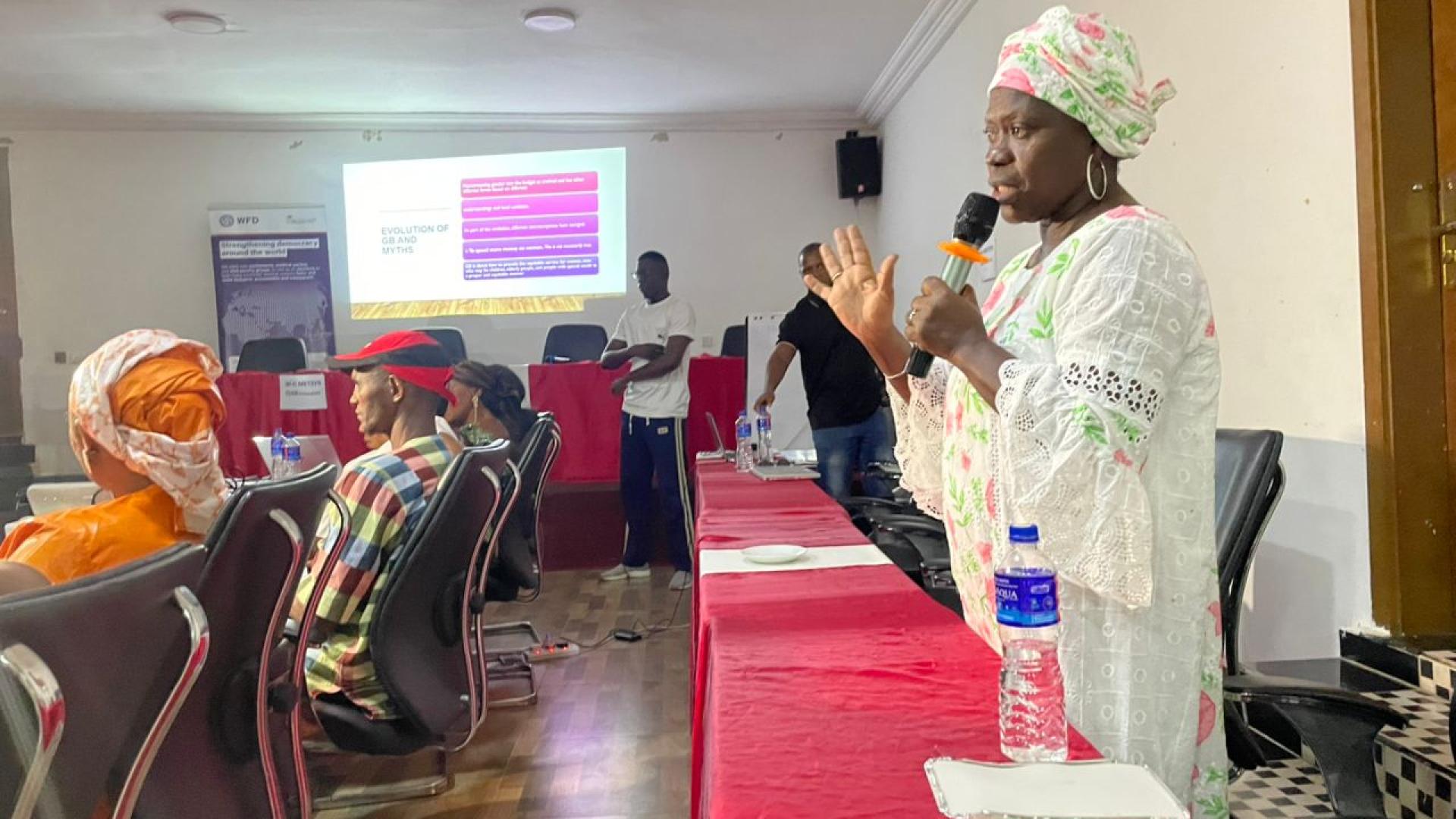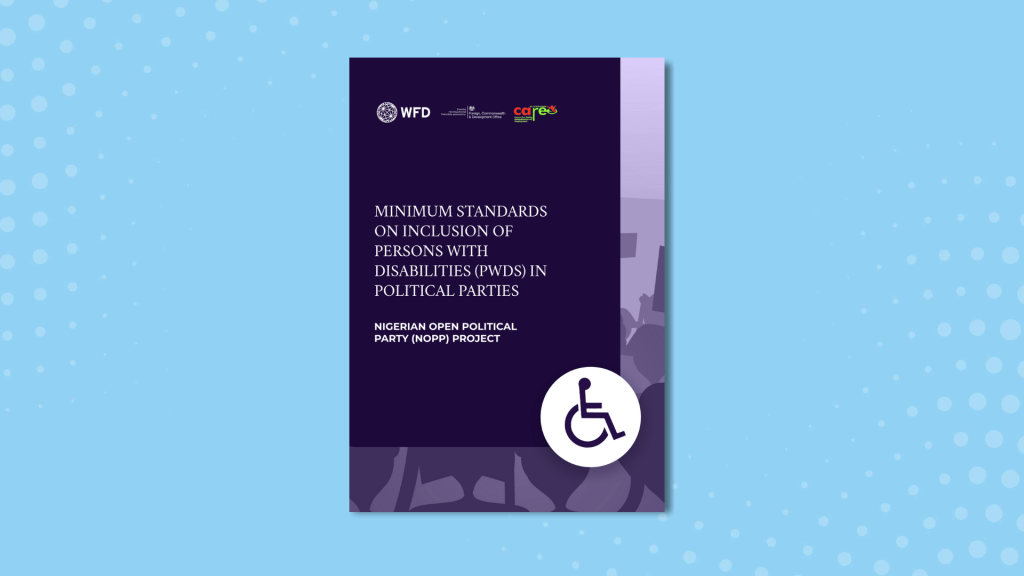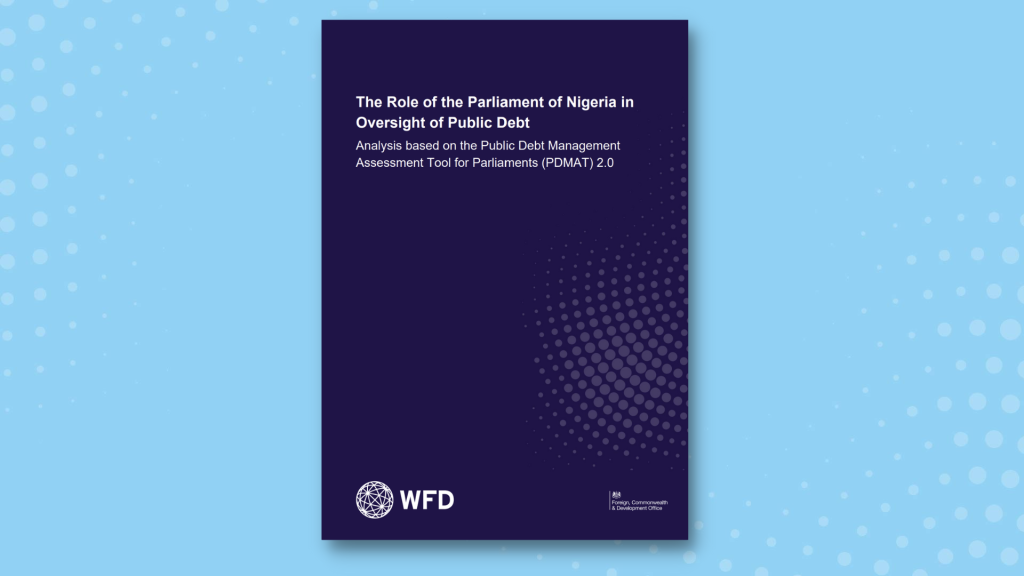WFD in Sub-Saharan Africa: Key achievements in 2024-2025

Westminster Foundation for Democracy (WFD)’s locally led teams in Sub-Saharan Africa have made a significant impact across the region over the past year. Their work has strengthened legislative transparency and accountability, advanced inclusive political reforms, enhanced oversight of public debt, supported women’s political leadership, deepened engagement with civil society, and promoted environmental democracy in climate action.
Below are some of the key achievements by country:
Kenya
Corruption-proofing of legislation
WFD successfully introduced a tool to help legislative drafters identify and close potential corruption loopholes in draft laws. This approach, adapted from WFD’s experience in Albania, has been formally adopted as standard practice by the Senate Department of Legal Services (DLS). Its adoption marks a significant shift toward more transparent and accountable lawmaking processes.
Futures Strategic Plan for the Senate
WFD supported the Senate in drafting a Futures Strategic Plan, introducing a new approach to anticipatory governance. The plan aims to institutionalise long-term thinking within parliamentary processes, factoring in socio-economic and climate considerations to ensure decisions made today benefit future generations.
Strengthening public debt oversight
WFD continued its technical assistance to the National Assembly’s Public Debt and Privatisation Committee, with a focus on improving legislative oversight of public debt. The team supported the drafting of the Public Debt Management Bill, guided by findings from WFD’s Public Debt Management Assessment Tool (PDMAT). In addition, capacity-building sessions were delivered to strengthen committee members' ability to scrutinise debt-related decisions more effectively.
Youth engagement and civic participation
In response to the Gen Z protests, WFD initiated exploratory efforts to engage youth and promote more meaningful connections between the parliament and citizens. Ideation sessions were held to inform future programming that reflects evolving civic expectations and enhances participatory democracy.
Foresight planning and research on violence against women in politics
Work is underway to institutionalise foresight planning within the Senate, enabling a more proactive approach to long-term challenges. In parallel, WFD is finalising research on violence against women in politics. The findings will be shared with stakeholders to support collective action and sustained momentum on this critical issue.
Nigeria
Launching the Political Party Performance Index (PPPI)
WFD introduced the PPPI, the first comprehensive baseline mapping of political party operations across all 36 states in Nigeria. This evidence-based tool tracks performance in inclusiveness, outreach, and legal compliance, and has been endorsed by the Independent National Electoral Commission (INEC), the Inter-Party Advisory Committee (IPAC), and various political parties.
Advancing disability inclusion
WFD and CARE Nigeria conducted the first-ever PAGE (Passage, Assent, Gazette, Execution) analysis of the Disability Act, carried out a national accessibility audit of political party offices and public buildings, and developed minimum standards for the inclusion of persons with disabilities in political parties. These efforts strengthened advocacy with the Inter-Party Advisory Council (IPAC) and have already led to tangible outcomes. The Labour Party’s establishment of a Directorate for Persons with Disabilities is another example of progress toward political inclusion.
Institutionalising Post-Legislative Scrutiny (PLS) in Oyo State
At the sub-national level, the institutionalisation of PLS was a strategic breakthrough. The Oyo State House of Assembly (OSHA) became the first in the country to establish a dedicated PLS unit, alongside Nigeria’s National Institute for Legislative and Democratic Studies (NILDS). The Oyo Assembly adopted a formal framework to embed the unit within its structure, allocated a budget, and selected an initial law to pilot the process.
Sierra Leone
Supporting women’s political leadership
WFD strengthened the Parliamentary Female Caucus, helping it become more unified and influential. The Caucus increased its presence in debates and played a central role in promoting the Gender Equality and Women’s Empowerment Act. Initiatives like the Orange Day ceremony and national consultations contributed to a new caucus strategy.
Strengthening parliamentary oversight and technical capacity
WFD provided targeted training in Post-Legislative Scrutiny (PLS) for 12 Members of Parliament, supported by the Office of the Law Clerk. This has enabled MPs to assess the impact of laws and propose evidence-based reforms.
Deepening civil society engagement
WFD facilitated the creation of the Parliament–Civil Society Network (ParlCSONet), establishing a lasting mechanism for civic input in parliamentary processes. The network features a functional Steering Committee and regular community feedback sessions and was highlighted as a standout Open Government Partnership (OGP) initiative in a regional meeting in Nairobi.
Enhancing public debt oversight
The introduction of the Public Debt Management Assessment Tool (PDMAT) brought the parliament into national borrowing discussions, engaging stakeholders such as the Deputy Speaker, the Public Accounts Committee, the Ministry of Finance, and the World Bank. This initiative advanced fiscal transparency and accountability.
The Gambia
Forming a parliamentary working group on post-legislative scrutiny (PLS)
WFD supported the establishment of a dedicated PLS working group within the National Assembly, a key step toward institutionalising legislative review processes that strengthen accountability and ensure laws are delivering intended outcomes.
Improving public debt oversight through cross-institutional dialogue
WFD convened a first-of-its-kind public debt session bringing together National Assembly Members, the Debt Management Office, and the Ministry of Finance. This initiative broke down silos and fostered cross-institutional collaboration, promoting more informed and accountable economic governance.
Strengthening parliament–civil society–media relations
WFD facilitated the signing of a Memorandum of Understanding (MoU) between the parliament, civil society, and the media. This formalised cooperation has improved transparency and engagement, with civil society increasingly participating in legislative processes and parliamentarians becoming more involved in civic activities.
Uganda
Strengthening parliamentary oversight and transparency
Through the EU-funded Strengthening Accountable Democracy in Uganda (SADU) programme, WFD supported Uganda’s Public Accountability Committees (PACs) and the Committee on Human Rights Affairs to enhance their oversight functions. WFD facilitated the analysis of the Auditor General’s Report and coordinated consultations with civil society on service delivery.
Promoting gender inclusion through a national women’s parliament
WFD continued to champion gender inclusion in Uganda by supporting women’s engagement in policymaking and legislative processes. Leveraging WFD-supported inclusion champion networks, a milestone was achieved with the convening of a special “Women’s Parliament” in the official Chamber of the Parliament of Uganda. Women from across the country debated and passed four resolutions, which were presented in person to the Minister of Gender for response in the formal Parliament’s proceedings on government action.
Regional initiatives
Environmental Democracy
Africa is among the continents most affected by climate change, with an urgent need to adapt to its impacts. In response, WFD launched initiatives across Nigeria, Kenya, Sierra Leone, Uganda, and The Gambia, taking a regional approach to pilot and promote environmental democracy in climate action.
In Nigeria, WFD presented a political economy analysis to the National Council on Climate Change. In Kenya, we developed a report and a climate financing monitoring tool to track the flow of funds from the national to the local level. In Sierra Leone, innovative drama and storytelling techniques were used to capture and convey citizens’ climate concerns to Members of Parliament. In Uganda, a special “Environment Parliament” was convened to review climate action and promote a Citizens’ Charter. Meanwhile, in The Gambia, WFD supported a review of climate-related policy and legislative gaps, which is now guiding the development of a new Climate Act.


